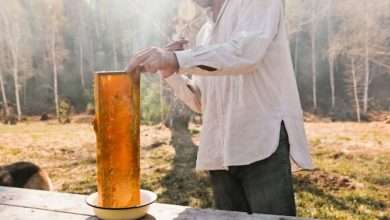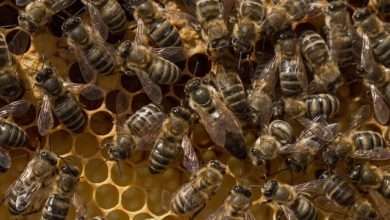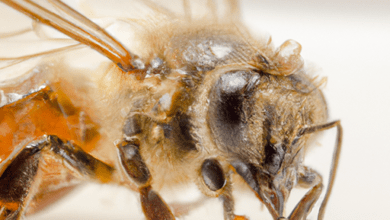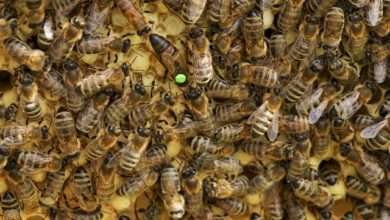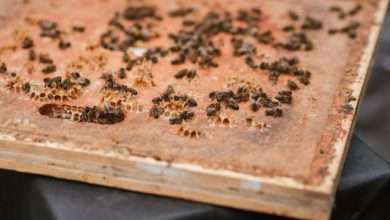How to Start Beekeeping in Idaho
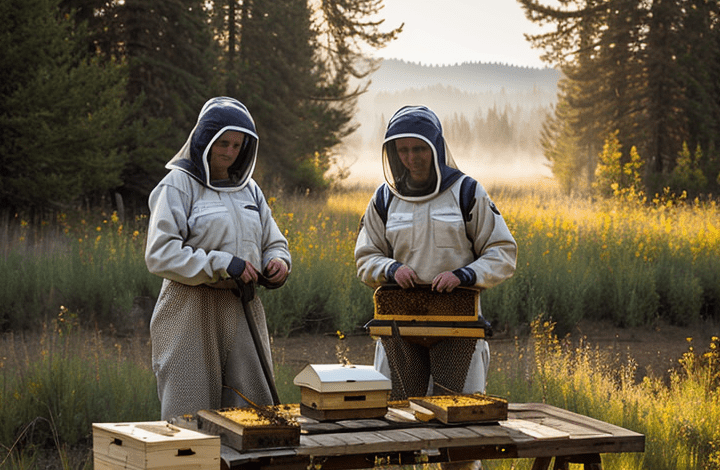
The Fascinating World of Beekeeping: A Beginner’s Guide
Are you intrigued by the world of beekeeping? Interested in becoming a beekeeper in Idaho but don’t know where to start? Look no further! In this beginner’s guide, we will provide you with essential tips and tricks to kickstart your beekeeping journey.
The Rewards of Beekeeping
Beekeeping is more than just a hobby; it’s a rewarding and sustainable practice that promotes biodiversity and helps maintain the delicate balance of our ecosystem. Whether you’re interested in harvesting honey, supporting pollination, or simply nurturing these incredible insects, this guide is for you.
With our comprehensive guide, you’ll gain the confidence and knowledge to embark on your beekeeping adventure. So, put on your beekeeping suit, grab your smoker, and let’s dive into the fascinating world of beekeeping together!
Why Start Beekeeping?
- Connecting with Nature: Beekeeping offers the opportunity to connect with nature in a unique and meaningful way. It allows you to observe bees in their natural habitat and gain a deeper understanding of their role in the ecosystem.
- Supporting Garden Pollination: Beekeeping can significantly impact garden pollination. The presence of a bee colony can enhance the pollination process, leading to better crop yields and improved garden health. Therefore, by becoming a beekeeper, one can actively support garden pollination and contribute to the overall well-being of the environment.
- Learning about Bee Behavior: Engaging in beekeeping provides a fascinating insight into the complex social structure of bees. It’s an educational experience that allows you to appreciate the intelligence and organization within a bee colony.
- Enjoying Honey Production: Another rewarding aspect of beekeeping is the ability to enjoy the delicious rewards of honey production. It’s a satisfying and tangible outcome of the care and effort invested in beekeeping.
- Educational Experience for Children: Beekeeping can also be a great educational experience for children, providing them with valuable lessons about nature, sustainability, and the importance of bees in our ecosystem.
- Therapeutic Relaxation for Adults: For adults, beekeeping can serve as a source of therapeutic relaxation. It offers a peaceful and meditative experience that allows individuals to unwind and connect with the natural world.
Beekeeping is a fascinating and rewarding activity that allows individuals to connect with nature, support garden pollination, and enjoy the delicious rewards of honey production. It is an educational and therapeutic experience that can be enjoyed by individuals of all ages.
Idaho’s Unique Climate and Agricultural Landscape for Beekeeping
Nestled in the northwest corner of the United States, Idaho is known for its stunning natural beauty and diverse agricultural landscape. Its climate, with four distinct seasons and varied geography, presents unique opportunities and challenges for beekeepers. With an abundance of crops and plants that rely on bee pollination, as well as a growing demand for locally-produced honey, beekeeping plays a vital role in Idaho’s agriculture industry.
The state’s agricultural landscape is diverse, with a wide range of crops and plants that serve as sources of nectar and pollen for bees. Idaho is a top producer of crops such as potatoes, sugar beets, and lentils, all of which rely on bee pollination for their growth and yield. This symbiotic relationship between bees and crops underscores the importance of beekeeping in Idaho’s agricultural industry. The role of beekeepers in maintaining a healthy bee population is also crucial, especially in the face of challenges such as pesticide exposure and habitat loss.
Legal Requirements and Regulations for Beekeeping in Idaho
Understanding the legal requirements and regulations for beekeeping in the state is essential for maintaining healthy and thriving bee populations. Beekeepers in Idaho are subject to a variety of laws and regulations that aim to protect both the bees and the community at large.
- Registration and Permitting
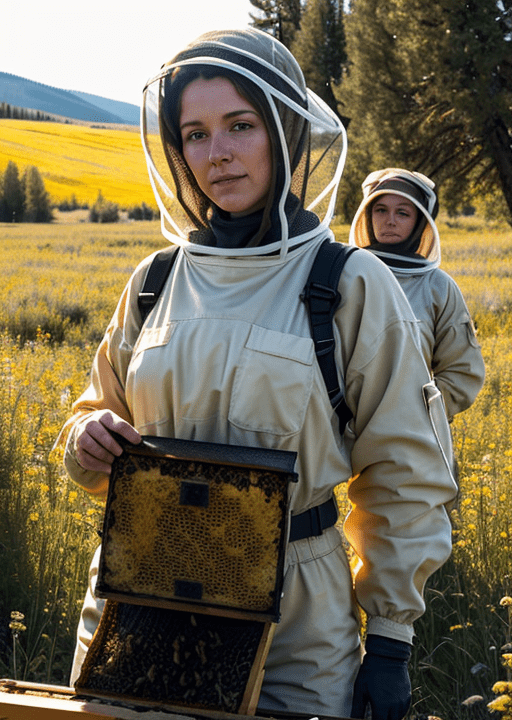
One of the first steps for beekeepers in Idaho is to obtain the necessary registration and permitting. Beekeepers must obtain a beekeeper registration from the Idaho State Department of Agriculture. Additionally, they must apply for an apiary permit, which regulates the placement and management of beehives. Compliance with local zoning ordinances is also crucial, as some areas may have specific regulations regarding keeping bees. It is important to note that failure to adhere to registration and permitting requirements can result in fines and penalties.
- Disease Management
Disease management is another key aspect of beekeeping in Idaho. Beekeepers are required to identify and report any signs of diseases within their hives to the state agriculture department. Implementing best practices for disease prevention, such as regular hive inspections and hygiene protocols, is vital for maintaining healthy bee colonies. The state also has specific regulations for disease management and may impose quarantine protocols in the event of widespread outbreaks. Beekeepers can access resources and support from the state for disease control and treatment.
- Hive Management
Proper hive management is essential for beekeepers to comply with Idaho’s regulations. Hive inspection requirements ensure that bee colonies are healthy and thriving, and that any issues are promptly addressed. Beekeepers must also adhere to regulations regarding hive placement and maintenance, as well as the species of bees they keep. Transporting hives within the state is subject to specific guidelines, and beekeepers are required to have emergency response plans in place for any hive-related issues.
- Environmental Considerations
Environmental considerations play a significant role in beekeeping regulations in Idaho. Pesticide use is closely monitored, and beekeepers must be aware of regulations regarding the application of chemicals that may impact bee populations. Providing access to clean water sources for bees is also important, as is considering land use and foraging areas to ensure that bees have adequate resources. Conservation practices for bee habitats and minimizing the impact on wildlife and natural resources are also key components of beekeeping regulations in Idaho.
It is important for beekeepers in Idaho to be familiar with the legal requirements and regulations that govern their practice. By adhering to these regulations, beekeepers can contribute to the health and sustainability of bee populations in the state, while also protecting the environment and supporting agricultural endeavors.
Essential Equipment for Beekeeping in Idaho
Beekeeping in Idaho can be a delightful and satisfying activity, but it is crucial to have the right tools and equipment to ensure the success of your beekeeping efforts. The climate and environmental conditions in Idaho can vary, making it essential to have the appropriate equipment to properly care for your bees and maximize honey production.
Beehive Components
When it comes to setting up a beehive, having the right components is essential to provide a suitable environment for the bees. The most commonly used type of hive in beekeeping is the Langstroth hive, which consists of several crucial components:
Bottom Board: The bottom board serves as the base of the hive, providing a strong foundation for the entire structure.
Brood Boxes: These deep wooden boxes are designed to house the brood frames where the queen lays her eggs and the bees raise their young.
Honey Supers: Shallower boxes are placed above the brood boxes to store surplus honey produced by the bees. Typically, there are two sizes available, medium and shallow.
Frames and Foundation: Wooden or plastic frames are used to hold beeswax sheets (foundation) for the bees to build comb and store honey.
Inner and Telescoping Cover: The inner cover is placed on top of the uppermost brood box, providing insulation and ventilation, while the telescoping cover acts as a protective top covering to shield the hive from the elements.
It is essential to have the right equipment and tools for beekeeping in Idaho to ensure the success of your beekeeping venture and maximize honey production.
Protective Gear for Beekeepers in Idaho
Beekeeping is a rewarding and fulfilling hobby, but it also comes with its own set of risks and challenges. One of the most important aspects of beekeeping is ensuring the safety and protection of the beekeeper. In the state of Idaho, where beekeeping is a popular activity, it is essential to have the right protective gear and tools for effective hive management.
- Beekeeping Suit: A high-quality beekeeping suit is a crucial piece of protective gear for beekeepers in Idaho. Made of lightweight and breathable materials, the beekeeping suit provides full-body coverage and protection from bee stings during hive inspections and honey extraction. It includes a full body suit and a veil to protect the face, ensuring that beekeepers can work around their hives without the fear of getting stung.
- Bee Gloves: Durable and protective gloves are essential for beekeepers, providing an additional layer of defense against bee stings. Bee gloves cover the hands and prevent stings while handling frames and other hive components, allowing beekeepers to work confidently and safely.
- Beekeeping Boots: Tall and sturdy boots specifically designed for beekeeping are necessary to prevent bees from crawling up pant legs and provide additional protection for the feet and lower legs. Beekeepers in Idaho must invest in high-quality beekeeping boots to ensure complete protection while working with their hives.
Tools for Effective Hive Management
- Hive Tool: A versatile tool, the hive tool is indispensable for beekeepers as it is used to pry apart hive components, scrape off excess wax or propolis, and access hard-to-reach areas within the hive. This tool is essential for maintaining and managing beehives effectively.
- Hive Smoker: The smoker is a crucial device for beekeepers, as it releases cool, white smoke that helps calm the bees during hive inspections and manipulation. This makes the process easier and less disruptive for the bees, ensuring a smooth and efficient management of the hive.
- Bee Brush: During hive inspections, beekeepers use a soft-bristled bee brush to gently remove bees from frames and hive components. This tool allows for careful and precise handling of bees without causing harm or distress to the colony.
- Queen Excluder: A queen excluder is a metal or plastic barrier that prevents the queen bee from laying eggs in the honey storage area by separating the brood box from the honey supers. This essential tool helps maintain the integrity of the honey production process and ensures the quality of the honey.
- Hive Feeder: In times of scarcity, beekeepers use hive feeders to provide supplementary nutrition or water for the bees. This tool is essential for supporting the health and well-being of the colony during challenging periods.
Protective gear and essential tools are vital for beekeepers in Idaho to ensure their safety and the effective management of their hives. By investing in high-quality gear and tools, beekeepers can engage in their passion with confidence and efficiency.
Equipment for Harvesting Honey
Beekeeping is a rewarding and fulfilling practice that provides a sweet reward in the form of honey. Once the bees have diligently produced honey, it’s crucial to have the right equipment for extracting and storing this golden nectar.
- Honey Extractor: The honey extractor is a vital mechanical device that plays a crucial role in the honey extraction process. This device operates by spinning honey frames, utilizing centrifugal force to extract the honey from the comb. The use of a honey extractor ensures efficiency in harvesting honey while preserving the integrity of the honeycomb for future use.
- Uncapping Knife: To prepare the honey frames for extraction, an uncapping knife is utilized to carefully remove the beeswax caps. This specially designed knife is heated to facilitate the smooth and precise removal of the caps, allowing easy access to the honey for extraction.
- Strainer or Sieve: Once the honey has been extracted, it is essential to remove any impurities and wax particles. A fine mesh strainer or sieve serves this purpose by effectively filtering the honey, ensuring that it is free from any debris, thus maintaining its purity and quality.
- Storage Containers: Proper storage is essential to maintain the freshness and quality of harvested honey. Airtight containers, such as jars or bottles, provide an ideal environment for storing the honey, keeping it protected from external elements and preserving its natural flavors.
Having the right equipment for honey extraction is paramount to the success of beekeeping endeavors in Idaho. By ensuring that beekeepers are equipped with the necessary tools, protective gear, and extraction equipment, a conducive environment for the bees is created, ultimately leading to maximized honey production.
Choosing the Perfect Location for Your Beehives
When it comes to beekeeping, selecting the right location for your beehives is crucial for the success of your colonies. The right location can significantly impact the bees’ ability to thrive and produce honey.
Here are some key factors to consider when choosing a site for your beehives:
- Sun Exposure: Honeybees thrive in sunny environments, so it’s important to select a location where the hives will receive ample sunlight throughout the day. Experienced beekeepers often recommend facing the colonies toward the morning sun to ensure they receive the optimal amount of sunlight.
- Wind Protection: Providing your beehives with some degree of wind protection is essential. Strong winds can disorient bees and hinder their foraging efforts. Consider natural windbreaks such as trees, fences, or buildings when planning the placement of your hives.
- Accessibility: Having easy access to the beehives for regular inspections, maintenance, and honey collection is important. Placing the hives on level ground, away from obstructions, will make these tasks more manageable.
- Distance from Human Activity: It’s crucial to keep the beehives at a safe distance from areas with high human activity to minimize the risk of disturbances or conflicts.
- Water Source: Bees require water for various activities within the hive, so it’s important to ensure that there’s a nearby water source.
- Vegetation and Floral Resources: Choosing a location with abundant floral resources is essential to ensure that bees have access to nectar and pollen to sustain the colony.
- Space: Providing enough space between hives is important to prevent overcrowding, which can lead to competition among colonies.
- Local Regulations: Check with local authorities for any regulations or zoning restrictions that may apply to beekeeping in your area.
- Predators: Identify and address potential threats from predators such as bears, skunks, or raccoons when selecting a location for your beehives.
The success of your beekeeping endeavors greatly depends on the location of your beehives. By carefully considering these factors and making informed decisions, you can create an optimal environment for your colonies to thrive and produce high-quality honey.
Sourcing Bees in Idaho: Where to Find Quality Bees for Your Apiary
When it comes to beekeeping, sourcing high-quality bees is a vital aspect of ensuring a thriving and successful apiary. Idaho, known for its abundant agriculture and favorable environment for beekeeping, offers several reliable options for obtaining bees.
- Local Beekeeping Associations: One of the most convenient and reliable sources for acquiring bees in Idaho is through local beekeeping associations. These associations have established connections with reputable breeders and even breed bees themselves. By reaching out to your nearest local beekeeping association, you can get recommendations on trusted bee suppliers within the state. These associations not only provide healthy and well-maintained bees but also offer valuable resources, mentorship, and support throughout your beekeeping journey.
- Bee Breeders and Suppliers: Idaho is home to numerous bee breeders and suppliers specializing in providing high-quality bees for apiaries. These breeders offer both package bees and nucleus colonies (nucs) for purchase. Package bees consist of a queen accompanied by a sufficient number of worker bees, while nucs consist of a queen, worker bees, and comb with brood, providing a head start to your colony. Purchasing from bee breeders and suppliers ensures the acquisition of healthy and productive bees for your apiary, albeit with some planning and additional costs.
- Local Beekeepers: Another valuable source for acquiring bees in Idaho is through local beekeepers in your area. Experienced beekeepers often have surplus bees they can sell or even offer swarm captures. Engaging with local beekeepers not only provides you with access to bees but also enables you to tap into their expertise, learn from their experiences, and establish valuable connections within the beekeeping community.
- Online Bee Suppliers: The advent of e-commerce has made it possible to access bees from various suppliers across the country, including in Idaho. Online bee suppliers offer the convenience of ordering bees from the comfort of your home and provide a wide range of choices in terms of bee packages, nucs, and different bee breeds. Carefully researching and choosing reputable online suppliers with good reviews is crucial to ensure the quality and health of the bees being shipped.
- Swarm Traps: Placing swarm traps can be an excellent strategy to attract swarming bees and capture them effortlessly. Swarming is a natural occurrence in the life cycle of honey bees, and by setting up swarm traps in strategic locations, you can increase your chances of capturing a passing swarm. These swarms can then be integrated into your apiary, significantly boosting its size and productivity.
- Bee Removal Services: Contacting local bee removal services can be a cost-effective way to acquire bees. These services are responsible for capturing and relocating bees that may pose a threat to public safety. By expressing your interest in adopting a colony, you can provide them with a suitable home. While this method may require patience and a bit of luck, it can be an exciting and economical way to source bees while contributing to the preservation of honeybee populations in Idaho.
Sourcing bees is a crucial step in establishing and maintaining a successful apiary. By considering the various options available in Idaho, such as local beekeeping associations, bee breeders and suppliers, local beekeepers, online bee suppliers, and bee swarm removal services, you can find the perfect match for your beekeeping endeavors.
The Advantages of Joining a Beekeeping Club
Joining a beekeeping club can have a significant impact on your beekeeping experience, whether you’re thinking about becoming a beekeeper or are already one. There are numerous benefits to being a part of a beekeeping club, including networking opportunities, opportunities for learning and education, mentorship and support, access to crucial resources, and engaging in social activities.
- Networking Opportunities: Becoming a member of a beekeeping club provides access to a network of individuals who share your passion for beekeeping. This network offers valuable opportunities to exchange ideas, experiences, and knowledge with fellow beekeepers. Forming partnerships within the club can also be advantageous for your beekeeping endeavors.
- Learning and Education: Beekeeping clubs often host informative meetings, workshops, and educational events aimed at expanding members’ knowledge and expertise in beekeeping. These events cover a wide range of topics, from bee behavior and hive management to honey production and disease prevention. Participating in these educational opportunities allows you to enhance your skills and stay updated with the latest trends and best practices in beekeeping.
- Support and Mentorship: Joining a beekeeping club grants you access to a supportive community of experienced beekeepers who are willing to provide guidance, tips, and support. Having mentors within the club can be particularly beneficial for beginners who may have many questions and uncertainties about beekeeping.
- Access to Resources: Many beekeeping clubs offer access to valuable resources that can be hard to come by as an individual beekeeper. These resources may include beekeeping libraries, equipment rentals, bulk purchasing options for supplies, and apiary sites for members to keep their hives. These resources can save you time and money while providing you with the tools and facilities you need to succeed in beekeeping.
- Social Engagement: Participating in club activities allows you to be part of a community that extends beyond beekeeping. Beekeeping clubs often organize social events, volunteer activities, and group outings, providing members with the chance to build friendships and connections with like-minded individuals.
Joining a beekeeping club offers a myriad of benefits, from valuable networking opportunities and educational events to access to vital resources and a supportive community. It can significantly enhance your beekeeping journey and make it more enjoyable and fulfilling.
Here is a List of Local Bee Clubs in Idaho:
- Treasure Valley Beekeepers Club: The Treasure Valley Beekeepers Club, based in Boise, is a thriving community that welcomes beekeepers of all experience levels. With a focus on education and camaraderie, the club hosts regular meetings, workshops, and social events throughout the year. Whether you’re looking to expand your knowledge or simply connect with fellow bee enthusiasts, this club provides a supportive environment for all members.
- Idaho Falls Beekeeping Association: Located in southeastern Idaho, the Idaho Falls Beekeeping Association is committed to fostering a diverse and inclusive beekeeping community. The association offers monthly meetings, workshops, and a mentor program for beginners. Whether you’re interested in honing your beekeeping skills or seeking guidance as a novice beekeeper, this club provides the necessary resources and support to help you thrive in the world of beekeeping.
- North Idaho Beekeepers Association: The North Idaho Beekeepers Association, based in Coeur d’Alene, serves beekeepers across northern Idaho, eastern Washington, and western Montana. With a focus on community outreach and education, the association offers monthly meetings, workshops, and a mentor program for new beekeepers. By joining this club, you’ll have the opportunity to connect with beekeepers from diverse geographical regions and gain valuable insights into regional beekeeping practices.
- Magic Valley Beekeepers: For those situated in the Magic Valley area, the Magic Valley Beekeepers club provides a platform for bee enthusiasts to come together and share their passion for beekeeping. Hosting meetings every 3rd Tuesday of odd-numbered months, the club offers a unique opportunity to engage with fellow beekeepers and expand your knowledge of beekeeping. Whether you’re a hobbyist or a professional, this club offers a welcoming environment for all.
Important Tasks and Duties of Beekeepers
Beekeeping is a fulfilling and rewarding activity that requires dedication and attention to detail. To ensure the health and productivity of bee colonies, beekeepers must perform a range of essential tasks and responsibilities.
- Regular Hive Inspections
Conducting regular inspections of bee hives is crucial for monitoring the well-being of the bees and the overall productivity of the colony. During these inspections, beekeepers should carefully observe the hive’s population, brood development patterns, honey stores, and signs of disease or pests.
- Feeding and Supplementing the Bees
Beekeepers may need to provide supplementary feeding to their bees, especially during periods when nectar and pollen sources are scarce. This can involve providing sugar water or commercially available bee supplements to ensure that the bees have enough food.
- Supering and Harvesting
In regions with abundant honey flows, such as Idaho, beekeepers must add supers or additional bee boxes to accommodate surplus honey production. Monitoring the hive’s honey stores and harvesting excess honey at the right time is essential for maintaining productivity.
- Prevention and Management of Swarms
The warm climate of Idaho can lead to rapid colony growth and increase the risk of swarming. Beekeepers must implement effective swarm prevention techniques, such as providing ample space within the hive and splitting colonies when necessary.
- Effective Queen Management
Monitoring the performance of the queen and taking necessary measures to ensure her health and productivity is essential. This may involve requeening the colony when necessary to maintain its strength and vitality.
Beekeeping requires a range of important tasks and duties to ensure the health and productivity of bee colonies. By conducting regular hive inspections, feeding and supplementing the bees, managing swarms, and effectively managing the queen, beekeepers can maintain robust and productive hives.
Planting a Honeybee-Friendly Garden – Native Pollinators in Idaho
Creating a honeybee-friendly garden is one way to support native pollinators in Idaho. By selecting native plants that provide food and shelter for honeybees, gardeners can help increase their populations and promote biodiversity.
Some of the top native plants that honeybees in Idaho benefit from include:
- Wild lupine (Lupinus perennis)
- Rocky Mountain beeplant (Cleome serrulata)
- Western coneflower (Rudbeckia occidentalis)
- Mountain bluebells (Mertensia ciliata)
- Blanket flower (Gaillardia aristata)
These native plants not only provide food for honeybees, but also offer important habitat and shelter for them. By incorporating these plants into your garden or landscape, you can help support local honeybee populations and encourage their pollination activities.
To maintain a honeybee-friendly garden, it is essential to avoid using pesticides and provide a water source for honeybees. Additionally, planting a variety of flowers that bloom at different times of the year can ensure a continuous food supply for honeybees. By taking these steps, gardeners can help protect and preserve native pollinators in Idaho for future generations to enjoy.
Selling Honey in Idaho
In order to sell honey in Idaho, beekeepers must adhere to certain regulations and requirements set forth by the state. It is important for beekeepers to understand these regulations in order to operate their business legally and responsibly. Below are some key points to keep in mind when selling honey in Idaho:
Labeling requirements
Honey that is sold in Idaho must be properly labeled with the name and address of the producer, as well as the net weight of the product. Additionally, any health claims or nutritional information must be accurate and verifiable.
- Licensing
Beekeepers who sell honey in Idaho must obtain a Food Establishment License from the Idaho Department of Health and Welfare. This license ensures that the honey is produced and handled in a safe and sanitary manner.
- Inspections
The Idaho Department of Agriculture may conduct inspections of honey production facilities to ensure compliance with state regulations. Beekeepers should be prepared for these inspections and maintain proper records of their honey production process.
- Packaging
Honey must be packaged in clean and sanitary containers to prevent contamination. Beekeepers should also take care to properly seal their containers to maintain the quality and freshness of the honey.
- Taxes
Beekeepers who sell honey in Idaho may be subject to sales tax on their products. It is important to understand the tax obligations and requirements for selling honey in the state.
By following these regulations and requirements, beekeepers can ensure that their honey business operates legally and responsibly in Idaho. It is important to stay informed about any changes to state regulations and to maintain compliance with all applicable laws. Selling honey in Idaho can be a rewarding and profitable venture, as long as beekeepers are diligent in following the rules and regulations set forth by the state.
Growing Your Beekeeping Skills
As you continue your beekeeping journey in the beautiful state of Idaho, it’s important to constantly expand your knowledge and skills in order to ensure the success of your apiary.
Fortunately, there are numerous resources and opportunities available to help you grow as a beekeeper and become an integral part of Idaho’s vibrant beekeeping community.
Resources for Continued Learning and Education in Beekeeping in Idaho
- Beekeeping Associations: Joining a beekeeping association in Idaho is a great way to connect with other beekeepers, share knowledge, and access resources such as workshops, classes, and expert speakers. The state association in Idaho is the Idaho Honey Industry Association.
- Extension Services: The University of Idaho Extension Service offers a wealth of information on beekeeping, including publications, workshops, and online resources. Extension agents can provide personalized guidance and assistance to beekeepers of all experience levels.
- Online Courses: There are a variety of online courses available for beekeepers looking to deepen their knowledge and skills. Platforms such as Beekeeping for Beginners and The Bee School offer comprehensive courses on topics ranging from hive management to honey production.
- Workshops and Conferences: Attending workshops and conferences is a valuable way to learn from experienced beekeepers and industry experts. Events such as the Idaho Honey Industry Conference and the Western Apicultural Society Conference offer educational sessions, hands-on demonstrations, and networking opportunities.
- Books and Publications: Building a library of beekeeping books and publications is essential for continued learning. Titles such as “First Lessons in Beekeeping” by Keith S. Delaplane, “The Beekeeper’s Handbook” by Diana Sammataro and Alphonse Avitabile and “Beekeeping for Dummies” by Howland Blackiston are popular choices among beekeepers.
- Mentoring Programs: Finding a mentor in the beekeeping community can provide invaluable guidance and support for new and aspiring beekeepers. Many beekeeping associations and clubs offer mentoring programs to pair beginners with experienced beekeepers.
By taking advantage of these resources for continued learning and education in beekeeping in Idaho, beekeepers can continue to hone their skills, expand their knowledge, and contribute to the health and success of their hives. Being proactive in seeking out educational opportunities will not only benefit individual beekeepers but also contribute to the overall sustainability of beekeeping in Idaho.
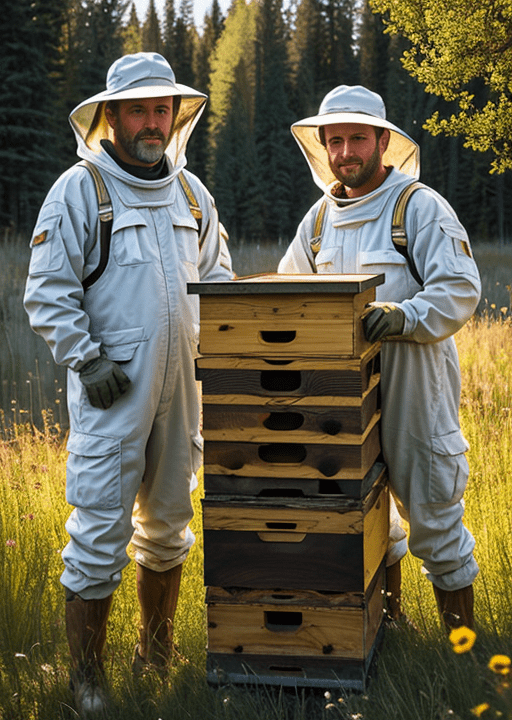
The Rewards of Beekeeping in Idaho
Beekeeping in Idaho may have its challenges, but the rewards are certainly worth the effort.
By following the steps outlined in this article, you have acquired the foundations to become a successful beekeeper. From setting up your hive to harvesting honey and sharing your delicious nectar with others, you are now well on your way to enjoying all the incredible benefits that beekeeping has to offer.
So, put on your beekeeping suit, grab your smoker, and let’s dive into the fascinating world of beekeeping together! Your bees are waiting to embark on this exciting journey with you. Happy beekeeping!
FAQ’s
Can anyone become a beekeeper?
- Yes, anyone with the right knowledge, skills, and commitment can become a successful beekeeper.
What are the first steps for starting beekeeping in Idaho?
- The first steps for beekeeping in Idaho include obtaining a beekeeper registration from the Idaho State Department of Agriculture and applying for an apiary permit to regulate the placement and management of beehives.
How should I choose beekeeping protective clothing?
- When selecting beekeeping protective clothing, prioritize safety and comfort. Look for a full-body suit or jacket made of durable, lightweight fabric that provides ample protection against bee stings. Ensure that the clothing has a veil or hood that securely covers your face and neck, as those are particularly sensitive areas. Additionally, gloves, beekeeping boots, and a hat can further enhance your protection.
What is the purpose of a queen excluder in beekeeping?
- A queen excluder is used to prevent the queen bee from laying eggs in the honey storage area, ensuring the purity of the honey.
How do beekeepers in Idaho adapt to the state’s unique environmental conditions?
- Beekeepers in Idaho employ specific strategies tailored to the region’s climate and agricultural landscape, including the use of different bee species and strains that are well-suited to the region. They also implement hive management techniques that take into account the state’s unique environmental conditions.
What are the common challenges faced by beekeepers in Idaho?
- Beekeepers in Idaho may encounter challenges such as variable weather conditions, pests and diseases (such as Varroa mites or foulbrood), hive management issues, and honeybee swarming. Staying informed and proactive in monitoring and addressing these challenges is crucial for maintaining healthy colonies.
Please note:
The FAQ answers provided here are general guidelines for beekeeping in Idaho. It is always recommended to consult local beekeeping authorities, experienced beekeepers, or relevant associations for specific and up-to-date information and regulations.
